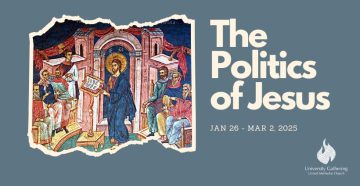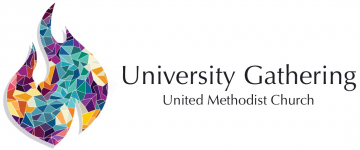The Politics of Jesus

Kindred in Christ,
This week we begin a new worship series titled, The Politics of Jesus. Together we will explore not only how politics includes elected officials and the governing process, but also how it deeply involves you and me, the opinions we hold, the actions we make, and especially the ways we relate to one another as human beings and followers of Jesus.
When we talk about politics, we of course talk about the long-standing system of racism and prejudice that is baked into the foundations of our country. We talk about Palestinian refugees and the recently enacted, and long-awaited ceasefire in Gaza. We talk about economic systems that create and promote income disparity for the many and prosperity for the few. We talk about the immigration sweeps and the separation of families. We talk about the continuing tragedy of gun violence in our country. We talk about the degradation of our planet. We talk about the violence and discrimination against women. We talk about the fearful rhetoric that is being espoused from the highest office of our nation against our beloved transgender siblings. We talk about the conflicts in the United Methodist Church, and those that have left our denomination over the move toward greater inclusion of the LGBTQIA+ community. And we talk about the challenges and gifts of living together as a congregation today in Seattle, with our partnerships, families, and friendships.
To be clear, we are not limiting ourselves to Democratic, Republican, or American politics. Rather, we will hear and focus on Jesus’ politics. Over the next few weeks, we will try to open ourselves up further to allowing the politics of Jesus to challenge, critique, and even expand our personal politics. For Jesus’ politics has implications for our lives and upon all the situations listed above. Yet the politics of Jesus are different from the kind of politics most of us see, experience, and probably even practice. His politics are driven, led, anointed, and filled by the Spirit, the life of God.
Biblical scholars often refer to Jesus’ reading of Isaiah 61 in Luke 4:16–21 as his “inaugural address.” This moment, in the synagogue at Nazareth, is seen as Jesus publicly declaring his mission and his vision for how we are to live and relate to one another. By reading the passage from Isaiah and stating, “Today this Scripture is fulfilled in your hearing” Jesus aligns himself with the prophetic vision of “bringing good news to the poor, release to captives, recovery of sight to the blind, and liberation for the oppressed.”
Our nation witnessed Jesus’ politics sharply challenging our American politics recently, on January 21, 2025, during the National Prayer Service at Washington National Cathedral. Episcopal Bishop Mariann Edgar Budde delivered a sermon urging our newly re-inaugurated president, Donald Trump, to, “In the name of God…have mercy on the people in our country who are scared now.” Her call for mercy and justice for the LGBTQIA+ community, immigrant populations, and other vulnerable communities sparked criticism from Trump, who accused her of politicizing religion, but Budde stood by her appeal through leadership grounded in humility and care for the marginalized—the politics of Jesus.
Join us in person and online this Sunday, as we kick off our new series and explore further how we might live if we adopted Jesus’ political platform as our own.
Alongside you,
Rev. Paul Ortiz
